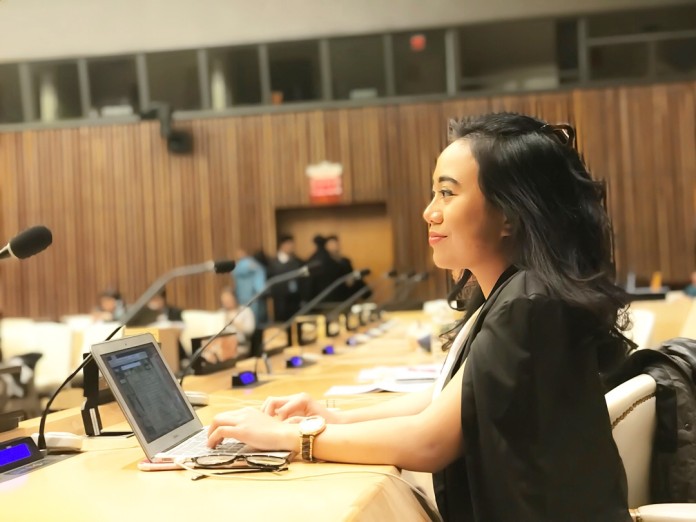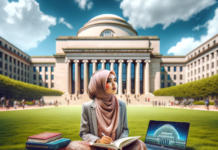In this article, former article contributor Isabella Veronica contemplates Indonesia’s role in the UN’s future. In her own words: A massive archipelago of 250 million people, Indonesia’s 65 million young people aged 10 to 24 comprise 28% of the population, and within these figures, only 81 individuals are representing Indonesia as a staff or officer inside the system of the largest international organization. Will this remain the same?
These numbers may be depressing to see. The question remains, how can a large nation like Indonesia be so dimly represented in the biggest multilateral forum? However, I quickly realized that much like age, these numbers will remain as just numbers. The fact of the matter is that, there are so many opportunities that we can use to improve the situation, regardless of age where Indonesians within the ‘millennial’ age bracket can be recognized and have their voices be heard. Change has to start from the inside, and what I am suggesting is for Indonesia to have a concrete national youth-led agenda.
This could have a real potential in influencing the still rather conservative, adult-led society structure, approach and system and transforming to a more youth-centric development efforts and leadership. For those reading this, you may be part of the largest group of cohort in history. Hence, wouldn’t you like to know the future of how you can move forward as a ‘millennial’ in your country? Therefore, the main concern is no longer about trying to find the answers to the question of ‘Why should young people get involved?’ but more about ‘How do we best involve the young people?’.
The situation for young people in Indonesia is as diverse, promising and complex as the nation itself. Today, adolescents and youth represent the largest generation in human history, and if we abide by our motto of Bhinekka Tunggal Ika (Unity in Diversity), we can settle upon the fact that nowadays diversity in Indonesia is more of a debate rather than a force of empowerment.
Putting young people at the heart of a national development policy is one ‘trendy or sexy theme’ currently buzzing in the United Nations, but in the case of Indonesia, it is easier said than done. Indonesia’s national development agenda, including its goal to achieve a middle-income country status, serves as the political and economic backdrop to the development of its youth. However, budgetary constraint is a key hindrance. Safe to say, creating a youth-led agenda is not one of the government’s key priorities.
So in January 2018, I took part in the Annual United Nations ECOSOC Youth Forum. The Youth Forum, held annually by ECOSOC since 2012, brings youth into discussions on the Millennium Development Goals and the post-2015 development agenda. It offers a unique opportunity for the youth to voice their opinions, share ideas, and think together about what they can do to achieve sustainable development. They take part in brainstorming sessions, interactive speaker panels and discussions with Member States on the main theme. By the end of the event, I gathered several ways that the Millennials of Indonesia can use their [super] powers in the United Nations, and the best part is that it cost nothing but an innovative idea and a single united voice:
It Only Takes An Idea
Indonesia is blessed with youth that has limitless potentials and borderless abilities. Jakarta is buzzing with creative energy and a sprawling group of ‘creativepreneurs’ with ideas from creating a tech-hub in rural areas, or engaging street children by creating a Rescue and Community Empowerment. The UN is a place where ideas not only can come to life, but be recognized for its creativity, and eventually sustainability. The ideas do not have to be big or even up and running, they can just simply still be ideas.
In 2017, Indonesia’s creative industry employed 11.57 million people accounting for 10.63% of the country’s employment, contributing 6.3% of the GDP or 7.4 billion US dollar. Approximately 80% of this new and emerging industry is carried out by young people. If we look back ten years ago, who would have thought that young people can contribute so much and in such a short period of time? This brings me to my next point:
Social Media and The Digital Warriors
Indonesia has a growing number of ‘netizens’ (frequent and fluent users of the internet around the world, usually defined as spending least 3 hours online per day) who now numbers to 31.7 million. Indonesia is also proudly one of the most pervasively ‘social’ countries online, with the world’s second largest number of Facebook users and the third largest number of Twitter users.
Information is being distributed, criticized, and disseminated through social media. It is the ease of connectivity that creates the conversation for the marginalized and eventually encourages users to build a sense of empathy. I realized that the ease of connectivity has created a platform for discussion and knowledge-sharing. So how can this translate to the United Nations?
Collective Growth
Empowering one another and to not shy away from exchanging stories is one way where we could instill the sense of collective growth for the young aspiring ‘statesmen’ of our country. It is the lack of information and knowledge about the United Nations that often hinders the participation of more Indonesian youth.
As such, there should be a platform or an inclusive collective hub where the exchange and transfer of knowledge and information about opportunities to work and participate in UN events can be easily accessed. This includes mentorship and training program from former interns or those who had gained exposure and experiences in the biggest international organization.
Thus, as the saying goes, “a nation is built from those who fought for it, and those who will.” I believe that in the near future there will be an increase in international exposure for young Indonesians to represent the voice and concerns of our nation on a global platform. The opportunities are out there, but we continue to find that there is a lack of knowledge about it, and mostly the support to achieve it. It is time that Indonesia’s youth begin to rise beyond the status quo, and make the UN young again. It must be, because it does not cost much to be #Active, #Creative, and #Contributive.
Photos are provided by author.










![To the Millennials of Indonesia: ‘Make the United Nations Young [Again]’ IMG_2243](https://indonesiamengglobal.s3.ap-southeast-1.amazonaws.com/wordpress_uploads/2018/07/IMG_2243.jpg)
![To the Millennials of Indonesia: ‘Make the United Nations Young [Again]’ IMG_2353](https://indonesiamengglobal.s3.ap-southeast-1.amazonaws.com/wordpress_uploads/2018/07/IMG_2353.jpg)

